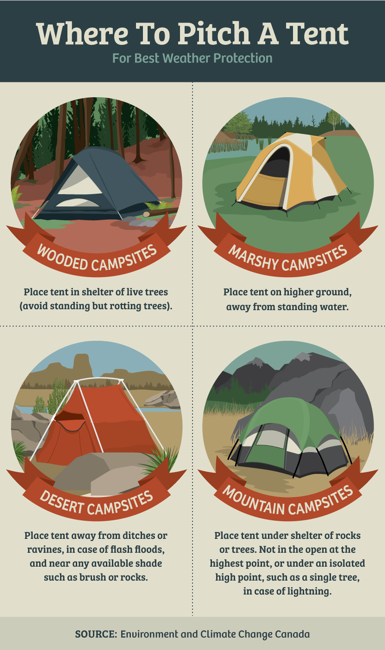Camping is a great way to spend time outdoors with your family – canoeing on a lake, hiking through the woods, or just relaxing by a campfire. But those who camp regularly know it’s not all sunshine and rainbows. Here’s what to expect from the unexpected and what to do when you encounter camping mishaps.

Bad weather is the most common mishap encountered by campers. Usually nothing more than an inconvenience or temporary delay of outdoor fun, weather can sometimes become dangerous. Here’s how to protect yourself from serious weather issues.
It’s good to be prepared for rain when camping. Be sure to bring a reliable rain fly for your tent, rain jackets for everyone in the family and, if rain is predicted, an extra shelter or canvas tarp to put over eating and cooking areas. It can also help to bring an extra beach towel to use as an entry mat to your tent to wipe off dirty feet when campsites get muddy.
High winds can cause major problems for campers. If you are in a camper or RV, fold down all awnings and external structures in the case of high wind and, in tents, secure your shelter with guy lines and stakes. Beware of “widow makers” when pitching tents or parking RVs: these dead-yet-standing trees can fall over easily in high winds.
Always plan your tent site with shade in mind and look for campsites with trees, rocks, or vegetation that will provide some relief. Freeze jugs of water before departing home so you can have access to icy water along with homemade ice packs. Wet bandanas or other clothing to cool skin and camp near bodies of water for easy access.
A regular occurrence most summers in the western United States, wildfires can certainly ruin a camping trip. The good news: families in campgrounds will have advance warning of any needed evacuations. Check your state’s US Forest Service website for possible fires in the area of your campground and have a back-up plan in case of road closures or campground closures. To avoid lightning strikes, ensure your campsite is not the highest point in an open environment, and do not hike to vistas and peaks if lightning is possible. Cars and RVs (except canvas-topped or fiberglass), bathrooms wired with plumbing and electricity, and other wired buildings are safe places in a lightning storm. Tents are not.
For all weather-related issues, know the campground’s evacuation procedures before your arrival. You can find this information at a ranger station or check-in booth.

Minor illnesses and injuries are common while camping, and most can be addressed with a simple bandage or extra s’more for dessert. Prevent blisters before they start by wearing well-worn shoes and sandals while camping. If you’re prone to blisters, use moleskin or bandages specifically for blisters before you hike.
Because you’re in the outdoors with less access to sterile environments, cuts and scrapes should be treated immediately to prevent infection. Always carry a standard first aid kit with antibiotic ointment packets and antiseptic wipes in addition to various-sized bandages.
If your campsite does not offer running water, such as a hike-in or backcountry site, beware of Giardiasis. Also known as Beaver Fever, Giardiasis is an intestinal illness caused by microscopic parasites. It’s caused by drinking untreated water and can result in diarrhea and dehydration. Campers at a campsite with running water (in developed countries) will not need to worry, but those camping where water is sourced from lakes or streams (or in undeveloped countries) will need to treat water before drinking.
Finally, deal with those annoying buzzing creatures in the outdoors with topical anti-itch cream or hydrocortisone for minor bites and stings. Always carry Benadryl (oral) in case of swelling or discomfort, even if you don’t think you’re allergic to any type of insect.
Tip: For all health-related issues, know where the closest hospital is located and have local emergency numbers on hand.
This Retro WON first appeared May 19, 2017.
The Women's Outdoor News, aka The WON, features news, reviews and stories about women who are shooting, hunting, fishing and actively engaging in outdoor adventure. This publication is for women, by women. View all posts by The WON